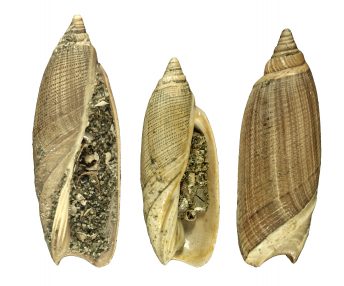Climate Resilient Mollusks
November 12, 2020

About 55 million years ago, a rapidly warming climate decimated marine communities around the world. But it was a different story for snails, clams and other mollusks living in the shallow waters along what is now the Gulf Coast of the United States. They were able to survive.
The findings, published Feb. 7, 2020, in the journal Scientific Reports, suggest that mollusks in the region might also adapt to the climate change of today.
“Mollusks are sort of unique in this aspect, as they are better adapted to cope with high temperatures,” said lead author William Foster, an assistant professor at the University College Dublin and former postdoctoral researcher at the Jackson School of Geosciences.
The backbone of the research is from the personal collection of amateur Austin paleontologist Christopher Garvie. He has collected Gulf Coast mollusk fossils during the past 30 years and estimates his collection includes more than a quarter million specimens from sites ranging from Texas to Florida on the Gulf Coast and Florida to New Jersey on the Atlantic Coast.
During the time the research focuses on, the Earth was in a warmer state than it is today, with no large ice sheets covering the poles. Even in this “hot house” state, the period contained multiple temperature spikes that warmed the planet even more. One of these spikes — the Paleocene- Eocene Thermal Maximum (PETM) — occurred about 55 million years ago and is frequently compared with the human-driven climate change happening today. During the PETM, atmospheric carbon dioxide rose rapidly, which in turn caused average global temperatures to rise 9 to 14 degrees Fahrenheit.
Although the PETM led to a decline in coral reef communities and the mass extinction of seafloor-dwelling plankton called foraminifera, the Gulf Coast mollusks survived.
“It does highlight that even in events that we think are devastating, there’s still a bit of hope from these resilient communities,” said co-author Rowan Martindale, an associate professor in the Department of Geological Sciences.
Back to the Newsletter